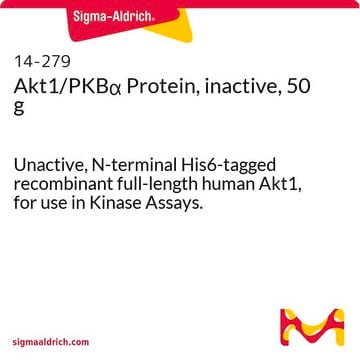This product is supplied in powder form. The solubility in water is 50 mg/mL, resulting in a hazy solution. To prepare a 1% Methylcellulose solution in cell culture media from this stock solution, follow these steps:
A 1% solution requires 1 g of solute per 100 mL of solution, equivalent to 10 mg/mL. The stock solution is 50 mg/mL. To achieve this, take 20 mL of the 50 mg/mL stock solution and dilute it to a total volume of 100 mL.
M7027
Methyl cellulose
viscosity: 15 cP, BioReagent, suitable for cell culture
Selecione um tamanho
Selecione um tamanho
About This Item
Produtos recomendados
fonte biológica
synthetic (organic)
linha de produto
BioReagent
Formulário
powder
técnica(s)
cell culture | mammalian: suitable
viscosidade
12-18 cP, 2 % in H2O(20 °C)
solubilidade
water: 50 mg/mL, clear to hazy
cadeia de caracteres SMILES
[*]OC[C@H]1O[C@@H](O[C@@H]2[C@@H](CO[*])O[C@@H](O[*])[C@H](O[*])[C@H]2O[*])[C@H](O[*])[C@@H](O[*])[C@@H]1O[*]
chave InChI
YLGXILFCIXHCMC-JHGZEJCSSA-N
Procurando produtos similares? Visita Guia de comparação de produtos
Descrição geral
Aplicação
- as a vehicle for metformin drug during oral gavage
- as a component of mammary epithelial cell growth medium for mammosphere culture
- as a supplement in spheroid 3D co-cultures for spheroid invasion assays using hanging drop protocol
Ações bioquímicas/fisiológicas
Código de classe de armazenamento
11 - Combustible Solids
Classe de risco de água (WGK)
WGK 1
Ponto de fulgor (°F)
Not applicable
Ponto de fulgor (°C)
Not applicable
Equipamento de proteção individual
Eyeshields, Gloves, type N95 (US)
Escolha uma das versões mais recentes:
Certificados de análise (COA)
Não está vendo a versão correta?
Se precisar de uma versão específica, você pode procurar um certificado específico pelo número do lote ou da remessa.
Já possui este produto?
Encontre a documentação dos produtos que você adquiriu recentemente na biblioteca de documentos.
Os clientes também visualizaram
Protocolos
Hematopoietic stem cell culture protocols for isolation, expansion, and differentiation of CD34+ cells including CFU assays.
-
How to practically reach a 1% solution of Methylcellulose in cell culture media that can't be heated excessively?
1 answer-
Helpful?
-
-
I would like to use methylcellulose in my cell culture media to optimize organoids in suspension. What methylcellulose product would be the most appropriate? And can I dissolve it directly into the cold media?
1 answer-
The methylcellulose products available are not currently tested for use in organoid suspension. However, a previously available product, S3812, was an IMDM-based stem cell culture medium that included a methylcellulose component with a 4000 cps viscosity, at a concentration of 1%. This would correspond to product M0512. The solubility in cold medium has not been determined. Please see the link below to review the general methylcellulose datasheet which includes a viscosity comparison table:
https://www.sigmaaldrich.com/deepweb/assets/sigmaaldrich/product/documents/183/010/m6385pis.pdfHelpful?
-
-
Can the M7027 pass through a 0.2um filter?
1 answer-
Methyl cellulose has a high molecular weight, and the viscosity of methyl cellulose solutions can also impede its ability to pass through such fine filters, as it can clog the filter pores. For sterilization, a 0.5-1% solution of methylcellulose can be autoclaved using standard conditions (121 °C, 15 psi, 15-20 minutes). Higher concentrations may lead to a portion of the methylcellulose falling out of solution.
Helpful?
-
-
Does this product need to be sterilized after dissolving for use in cell culture?
1 answer-
Solutions of this material require sterilization for cell culture applications. A 0.5-1% solution of methylcellulose can be autoclaved using standard conditions (121 °C, 15 psi, 15-20 minutes). Higher concentrations may lead to a portion of the methylcellulose falling out of the solution.
Helpful?
-
-
Hello sir, I need to know molar mass or molecular weight of this code of Methyl cellulose or tell me how can i calculate can you help me?
1 answer-
The molecular weight is not analyzed on a lot to lot basis. The approximate molecular weight is 88,000 Da with methoxy substitution between 27.5 - 31.5% (weight).
Helpful?
-
-
Can I use this to make 0.5% solution in water which will be used as the solvent to dissolve neratinib and administrate to mice through oral gavage?
1 answer-
This product can be solubilized in water at 50mg/ml which is a 0.5% solution. This product is tested for use in cell cultue, however it has not been tested for in vivo applications. Suitability for in vivo use will need to be validated by the end-user. See the link below for a general product information sheet for Methyl Cellulose. Note product M7140, which is the general research grade of this product. All details for M7140 will apply to M7027.
https://www.sigmaaldrich.com/deepweb/assets/sigmaaldrich/product/documents/251/785/m0512pis.pdfHelpful?
-
-
Can I use this Methyl cellulose, Product M7027, for cloning or plaque assays?
1 answer-
Probably not. Product No. M7027 has a very low viscosity (viscosity 15 cP, 2% solution in water) and is used for thickening culture media. Product No. M0387 (viscosity 1,500 cP, 2% solution in water) is recommended for plaque assays, and Product No. M0512 (viscosity 4,000 cP, 2% solution in water) is recommended for cloning or colony growth assays.
Helpful?
-
-
How do I store a stock solution of Methyl cellulose, Product M7027?
1 answer-
A sterile solution of methylcellulose can be stored at room temperature for up to 1 year.
Helpful?
-
-
What is the Department of Transportation shipping information for this product?
1 answer-
Transportation information can be found in Section 14 of the product's (M)SDS.To access the shipping information for this material, use the link on the product detail page for the product.
Helpful?
-
-
How can I make a solution of Methyl cellulose, Product M7027?
1 answer-
There are two methods for solubilizing methylcellulose. Please see the product insert for Product No. M0387 for the protocols.
Helpful?
-
Active Filters
Nossa equipe de cientistas tem experiência em todas as áreas de pesquisa, incluindo Life Sciences, ciência de materiais, síntese química, cromatografia, química analítica e muitas outras.
Entre em contato com a assistência técnica





